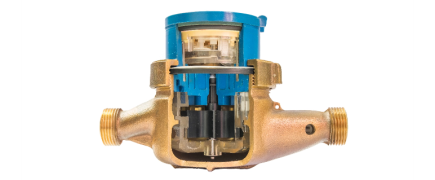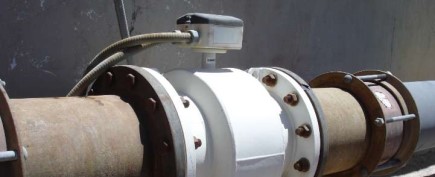Flow meters play a pivotal role in industries, environmental management and everyday applications. They constantly provide precise measurements that are crucial for a multitude of industries. These devices are designed to measure the flow rate for liquids, providing invaluable insight and data on the movement and quantity of the fluids. To truly grasp how flow meters work, it's essential to look at the intricate mechanics and multifaceted applications in which they are used.
What Is A Flow Meter And How Does It Operate?
At its core, a flow meter is designed to measure the flow rate of liquids through a specific system. The fundamental principle behind flow meters involves detecting and quantifying the liquid's movement, allowing for accurate monitoring and control. The mechanisms employed by flow meters vary, but their primary goal remains consistent – to provide real-time data on liquid flow.
Flow meters operate on several principles, with common types including electromagnetic, ultrasonic, vortex shedding, positive displacement and turbine meters. Regardless of the method, the objective is to gauge the velocity or volume of liquid passing through the system at a given point.
The 5 Different Types of Water Flow Meters
Flow meters are diverse, expansive, and technical. Each measurement uses a specific metric and looks at the intricate data for the most accurate reading.
- Electromagnetic flow meters for water applications provide precise measurements, making them indispensable in industries relying on accurate water flow data.
- Ultrasonic flow meters for liquid applications because non-intrusive measurement is a priority. Their versatility makes them valuable in industries ranging from pharmaceuticals to wastewater management.
- Vortex shedding flow meters in liquid systems demonstrate the reliability of vortex shedding flow meters, where consistent and accurate flow rate measurements are crucial for optimal performance.
- Positive displacement flow meters for viscous liquids, such as food processing or chemical manufacturing, benefit from the precision offered by positive displacement flow meters in measuring liquid flow.
- Turbine flow meters for water treatment plants and beyond require high accuracy to turn to turbine flow meters, relying on the rotor's spin to provide accurate and reliable flow rate readings.
From Turbine to Ultrasonic: A Deep Dive into Different Flow Meter Technologies
There are various types of flow meters, and each operates with a unique technology to gather and monitor data in various ways.
Electromagnetic Flow Meters
These flow meters operate based on Faraday's law of electromagnetic induction. As conductive liquids move through a magnetic field, a voltage is proportional to the flow rate. Electromagnetic flow meters are particularly effective for conductive fluids, making them ideal for various industrial applications.
Ultrasonic Flow Meters
This type of flow meter measures the time it takes for ultrasonic signals to travel against and with liquid flow. By calculating travel time differences, ultrasonic flow meters provide accurate flow rate readings. They are non-intrusive and suitable for a wide range of fluid types.
Vortex Shedding Flow Meters
Vortex shedding flow meters operate on the principle of creating vortices as liquid flows past a bluff body. The frequency of these vortices correlates with the flow rate. This type is known for its reliability and is commonly used in applications where precise measurements are essential.
Positive Displacement Flow Meters
These flow meters trap and measure liquid in defined volumes, directly measuring flow. Positive displacement flow meters are suitable for viscous fluids and are known for their accuracy, especially in low-flow scenarios.
Turbine Flow Meters
In turbine flow meters, the liquid flow causes a rotor to spin, and the rotation speed is directly proportional to the flow rate. These meters are widely used in applications requiring high accuracy, making them a staple in industries such as water treatment and petroleum.
Real-World Scenarios Where Flow Meters Excel
In the dynamic landscape of fluid dynamics, digital flow meters emerge as indispensable tools, seamlessly blending precision and practicality. These real-world scenarios spotlight the expertise of flow meters, transforming them from mere instruments to critical tools.
Water Treatment Plants
Flow meters play a crucial role in water treatment, ensuring that the right amount of chemicals is injected into the water stream for purification. Accurate flow measurements contribute to the efficiency of the treatment process.
Industrial Manufacturing
In manufacturing processes, especially those involving liquids, precise control of flow rates is essential. Flow meters enable manufacturers to maintain consistency in production, leading to higher-quality outputs.
Pharmaceutical Production
Pharmaceutical manufacturing demands precision in liquid handling. Flow meters contribute to the accuracy required in dosage formulation and the blending of pharmaceutical ingredients.
Environmental Monitoring
Flow meters assist in monitoring liquid discharges into natural water bodies, ensuring compliance with environmental regulations. This is particularly crucial in industries where wastewater management is a key concern.
The Role of Flow Meters in Environmental and Industrial Monitoring
The environmental impact of industrial processes cannot be overstated, and flow meters play a significant role in monitoring and mitigating this impact. Industries are under increasing pressure to adhere to environmental regulations and minimize their ecological footprint. Flow meters aid in achieving these goals by:
Controlling Liquid Discharges
Flow meters provide real-time data on liquid discharges, allowing industries to control and regulate the release of effluents into the environment. This ensures that environmental standards are met, and pollutants are minimized.
Optimizing Water Usage
Industries, especially those with high water consumption, benefit from flow meters by optimizing water usage. Accurate measurements enable precise control over water flow, reducing wastage and contributing to sustainability efforts.
Monitoring Leakages
Flow meters help detect and monitor leakages in pipelines. Rapid identification of leaks allows for prompt repairs, preventing potential environmental hazards and conserving resources.
Ensuring the Accuracy and Reliability of Flow Meter Readings
Flow meters' effectiveness is contingent on their readings' accuracy and reliability. Several factors contribute to ensuring the precision of flow measurements:
- Regular calibration is essential to maintain the accuracy of flow meters. Calibration procedures should be conducted per industry standards to guarantee reliable measurements.
- Proper installation of flow meters is critical. Factors such as pipe size, orientation and disturbances in the flow path can impact accuracy. Following manufacturer guidelines during installation is imperative.
- Routine maintenance is necessary to keep flow meters in optimal condition. Regular checks, cleaning and troubleshooting help identify and address issues before they compromise the accuracy of measurements.
- Investing in high-quality flow meters is crucial for reliable performance. Quality equipment ensures durability, accuracy and longevity, minimizing the risk of malfunctions or inaccuracies.
How Do Flow Meters Contribute to Efficiency Across Various Sectors?
Deploying flow meters across diverse sectors yields numerous benefits, ultimately improving operational efficiency. Here's a closer look at how flow meters enhance efficiency in specific industries:
How Do Flow Meters Work for the Energy Industry?
Flow meters play a pivotal role in the energy sector, precisely measuring the flow of liquids such as oil and water. Accurate measurements enable efficient resource allocation and billing processes.
How Do Flow Meters Work for Chemical Manufacturing?
In chemical manufacturing, where precise quantities are paramount, flow meters ensure accurate dosing and mixing of chemicals. This precision contributes to the quality and consistency of the final product.
How Do Flow Meters Work for Food and Beverage Production?
Flow meters are integral to the food and beverage industry, facilitating precise control of liquid ingredients in various processes, from mixing and blending to filling and packaging.
How Do Flow Meters Work for Municipal Water Management?
Municipalities rely on flow meters for monitoring and managing water distribution systems. Accurate measurements aid in identifying leaks, optimizing water usage and ensuring a consistent water supply to residents.
Exploring Future Trends in Flow Meter Technology
As technology continues to advance, so too do the capabilities of flow meters. Several trends are shaping the future of flow meter technology:
- The integration of wireless technology enables remote monitoring and control of flow meters, enhancing accessibility and facilitating real-time decision-making.
- Flow meters increasingly incorporate advanced data analytics capabilities, providing insights into trends, patterns and potential issues. This proactive approach to data analysis enhances overall system performance.
- The integration of additional sensors, such as temperature and pressure sensors, enhances the overall functionality of flow meters. This comprehensive data collection allows for a more nuanced understanding of fluid dynamics.
Frequently Asked Questions: How Does A Flow Meter Work?
What is the primary function of a flow meter?
A flow meter's primary function is to measure the rate of liquid flow within a system accurately. This information is crucial for various industries to optimize processes, ensure efficiency and comply with regulatory standards.
How Accurate Are Flow Meters?
When appropriately calibrated and maintained, modern flow meters can achieve high accuracy levels, often within a few percentage points. Their ability to consistently deliver precise measurements makes them trusted instruments in industries where precision is not just a goal but a necessity.
Are flow meters only used in large industrial settings?
While flow meters are widely used in large industrial settings, they are also employed in smaller-scale applications. Various industries, including pharmaceuticals, food and beverage and municipal water management, utilize flow meters for precise liquid flow measurement.
How often should flow meters be calibrated?
The calibration frequency depends on factors such as the type of flow meter, environmental conditions and industry regulations. Generally, flow meters should be calibrated regularly, with intervals ranging from months to years, as recommended by the manufacturer and industry standards.
Uncovering a Flow Meter’s Purpose in Surprising Applications
Beyond industry and environmental monitoring, flow meters find themselves in surprising and diverse applications, even in everyday scenarios we aren’t expecting to see them.
- Ski resorts use flow meters to control the water and air mixture precisely for artificial snow production. Accurate measurements ensure the right snow consistency for optimal skiing conditions.
- In aquaculture, flow meters help monitor water flow in fish tanks, ensuring optimal conditions for fish growth. This application aids in maintaining a healthy aquatic environment.
- Breweries rely on flow meters to control the flow of liquids during brewing. This precision is vital for maintaining the quality and consistency of the final brewed product.
Liquid flow meters are indispensable tools across various industries, providing the crucial data needed to optimize processes, enhance efficiency and meet regulatory requirements. As technology advances, the future holds promising developments that will further elevate the capabilities of flow meters, ensuring their continued relevance in the dynamic landscape of industrial operations. It's a precise blending of technology, precision and adaptability.
Whether measuring water flow in an industrial pipeline or orchestrating water circulation in an aquarium, these devices are integral to the seamless function of countless processes. Understanding how flow meters work is not just a glimpse into the intricacies of fluid dynamics; it's a journey into the heart of innovation.
.jpg)
Explore the Precision of Flow Meters for Your Industry
Are you curious about the impact flow meters can have on your specific industry? Discover the precision, efficiency, and regulatory compliance they bring. Explore our range of flow meters designed to meet diverse industrial needs. Don't just witness innovation; integrate it into your operations for enhanced performance. Visit our website to learn more about the cutting-edge world of flow meters and revolutionize your liquid flow management today.






